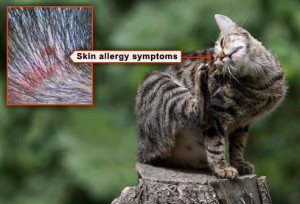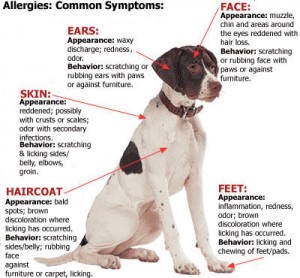Posts in Category: Seasonal
Halloween Hazards & Tips
Going trick-or-treating with your pet? Be sure both of you wear reflectors for safety. Watch your pet for signs of stress (heavy panting and anxious expression). And be kind: don’t share your Halloween candy with your pet. An upset stomach can occur, or even worse, your pet can get poisoned from too much chocolate.
Other than that, have a howlin’ good time!

We have a great assortment of Halloween costumes and halloween themed toys for your pet available every October. Check them out.
If you take a few simple precautions, Halloween can be fun and safe for both you and your pet. It’s another way to treat your pet as part of the family.
Picking out a special costume to dress up your pet and take him trick-or-treating is lots of fun. Make it a special adventure for you both. Take your pet with you only if he enjoys other people and strange sights and sounds. Keep him on a leash at all times. Fit his costume so that it is comfortable and be sure to supervise him so he doesn’t get tangled up in any part of it. When you’re walking in the dark, be careful to wear something reflective or flashing so that motorists will see both of you. And remember that all of the goodies you receive are for you alone; candy, and especially chocolate, can be harmful to pets. You can pick up some dog safe cookies at Harmony so your pet doesn’t feel left out! 
Happy Halloween everyone!
Life’s an itch! Is an itch just an itch, or is it an allergy?
“Max”, the schnauzer next door begins to wheeze, scratch and chew at himself at the first sign of Spring. “Kitty”, the sweet tabby across the street gets an upset tummy whenever she eats a particular food. And “Ginger”, your very own lovable mutt, scratches herself raw anytime she’s bitten by even one flea. She even keeps you up at night with the constant scratching and collar jingling!
There are countless diseases that can cause pets to scratch including mange, fungal infections, ringworm, some bacteria, and even shampoo residue left on the pet’s skin after bathing. But the poor, uncomfortable pets mentioned above suffer from an affliction called allergies.
poor, uncomfortable pets mentioned above suffer from an affliction called allergies.
An allergy is the body’s reaction to a substance it can’t tolerate well. When the body comes in contact with an allergen (allergy-causing substance), either through physical contact, through something eaten, or by inhaling the substance, it produces antibodies and is called an allergic reaction. Common contact allergens include house dust, pollen, feathers, flea saliva, wandering Jew plants, ragweed, staph bacteria, and grass.
In pets, the allergic reaction can cause various symptoms including vomiting, diarrhea, and other gastrointestinal problem; respiratory problems; a runny nose and runny eyes; or itchy skin. Allergic pets will often lick their paws, scratch or rub their faces, or have watery eyes. Repeatedly red, or infected ears can also be a result of an allergic reaction. The constant scratching can produce bacterial skin infections and hair loss.
Flea allergy is the most common allergic reaction. Signs include intense itching, red skin, and the appearance of small, hard, red bumps called papules. The most common sites are the base of the tail (a common area for fleas), along the spine, and on the pet’s inner thighs and abdomen.
In halant allergy (called atopy) is the second most common allergic skin disease, mostly in dogs. At first, the condition is seasonal, but may become almost constant as the dog ages.
halant allergy (called atopy) is the second most common allergic skin disease, mostly in dogs. At first, the condition is seasonal, but may become almost constant as the dog ages.
Sensitivity to foods, rawhide chews, medications, and other ingested items, can occur. Food allergies are often diagnosed by blood testing, and by feeding an affected pet a hypoallergenic diet for several months. To complicate the allergy picture, a pet may have multiple allergy problems. So a pet with food allergies, for example, may also have atopy or flea allergy.
Diagnostic tests often done to accurately determine the cause of allergies. Intradermal skin testing for contact dermatitis and atopy, and blood testing for most allergies, are two methods used for diagnosis. Treatment may consist of trials of various antihistamines, as well as nutraceuticals (nutritional medications that assist the body’s natural defenses), steroids, or hyposensitization therapy, which is a series of injections to reduce the sensitivity to allergens. Antibiotics are often indicated when the constant scratching has caused a bacterial infection.
While there are no cures, pets can lead much happier, stress free lives when the allergens are identified, avoided and the symptoms eased through different treatments. Early detection can help prevent more serious problems from developing.
Preparing your Pet for the Cold Weather
While Harmony Animal Hospital encourages pet owners to keep their cats and dogs inside at all times for their safety and health, if you or anyone you know has an outdoor pet, ensure they are brought inside during cold  nights. And since we don’t see many cold nights down here in the Sunshine State, we thought we would go over a few things that we don’t usually have to think of.
nights. And since we don’t see many cold nights down here in the Sunshine State, we thought we would go over a few things that we don’t usually have to think of.
- If you are one of the many in the area who care for feral and/or barn cats, be sure to provide plenty of straw. It traps the heat from the animals’ bodies and keeps them insulated and warm in the cold weather.
- During unusually cold nights, outdoor cats sometimes sleep under the hoods of cars. When the motor is started, the cat can be injured or killed by the fan belt. If there are outdoor cats in your area, check under and/or bang loudly on the car hood before starting the engine to give the cat a chance to escape.
- Never leave your dog or cat alone in a car during cold weather. A car can act as a refrigerator, holding in the cold and causing the animal to freeze to death.
- Like coolant, antifreeze is a lethal poison for dogs and cats. Be sure to thoroughly clean up any spills from your vehicle, and consider using products that contain propylene glycol rather than ethylene glycol. Visit the Pet Poison Helpline for more information.
- Make sure your companion animal has a warm place to sleep, off the floor and away from all drafts. A cozy dog or cat bed with a warm blanket or pillow is perfect.


